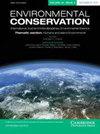政府承诺恢复森林,但恢复森林需要什么?
IF 2.6
3区 环境科学与生态学
Q2 BIODIVERSITY CONSERVATION
引用次数: 7
摘要
森林恢复正受到许多公共和私人行为者越来越多的关注,但很少有大规模的经验。我们探讨了森林覆盖率增加或稳定的10个案例,或者有显著的森林扩张动力的案例,以了解哪些因素可以促进森林恢复的扩大。我们制定了一份数据收集清单来搜索文献,并采访了关键的线人。我们的分析确定了15个促进森林恢复的因素,包括缓解土地退化、干旱或洪水或促进生物多样性保护的愿望。我们还确定了一些有助于实施森林恢复的因素,如支持性政策框架,其中包括森林恢复计划、财政激励措施、真正的合作安排、森林、树木和特定商品和服务的保有权,以及专门机构、外部利益攸关方、地方社区和地方当局的作用。为了使恢复持续下去,有必要将其纳入国家机构,确保跨景观的部门整合,确保多样化和长期融资,并将其纳入地方机构。本文章由计算机程序翻译,如有差异,请以英文原文为准。
Governments commit to forest restoration, but what does it take to restore forests?
Summary Forest restoration is receiving increased attention from many public and private actors, but few large-scale experiences exist. We explored 10 cases where forest cover had either increased or stabilized or where there was a significant drive towards forest expansion to understand which factors can facilitate the scaling up of forest restoration. We developed a data collection checklist to search the literature and we interviewed key informants. Our analysis identified 15 motivating factors for forest restoration, including the desire to mitigate land degradation, droughts or floods or to contribute to biodiversity conservation. We also identified some factors that facilitate the implementation of forest restoration, such as a supportive policy framework that includes forest restoration plans, financial incentives, truly collaborative arrangements, tenure rights to forests, trees and specific goods and services from these, the roles of specialized agencies, external stakeholders, local communities and local authorities. For restoration to be sustained, it is necessary to integrate it into national institutions, ensure sectoral integration across landscapes, ensure diversified and long-term financing and embed it in local institutions.
求助全文
通过发布文献求助,成功后即可免费获取论文全文。
去求助
来源期刊

Environmental Conservation
环境科学-环境科学
CiteScore
5.20
自引率
3.70%
发文量
43
审稿时长
>36 weeks
期刊介绍:
Environmental Conservation is one of the longest-standing, most highly-cited of the interdisciplinary environmental science journals. It includes research papers, reports, comments, subject reviews, and book reviews addressing environmental policy, practice, and natural and social science of environmental concern at the global level, informed by rigorous local level case studies. The journal"s scope is very broad, including issues in human institutions, ecosystem change, resource utilisation, terrestrial biomes, aquatic systems, and coastal and land use management. Environmental Conservation is essential reading for all environmentalists, managers, consultants, agency workers and scientists wishing to keep abreast of current developments in environmental science.
 求助内容:
求助内容: 应助结果提醒方式:
应助结果提醒方式:


